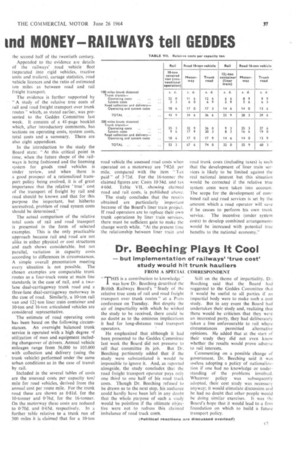Dr. Beeching Plays It Cool
Page 39

If you've noticed an error in this article please click here to report it so we can fix it.
— but implementation of railway& 'true cost' study would hit trunk hauliers
FROM A SPEC! 4I. CORRESPONDENT
THIS is a contribution to knowledge was how Dr. Beeching described the British Railways Board's Study of the relative true costs of rail and road freight transport over trunk routes" at a Press conference on Tuesday. But despite the air of impartiality with which he wished the study to be received, there could be no doubt as to the ominous implications it had for long-distance road transport operators.
He emphasized that although it had been_ presented to the Geddes Committee last week the Board did not presume to tell that committee its job. But Dr. Beeching pertinently added that if the study were substantiated it would be impossible to ignore it. And, as reported alongside, the study concludes that the road freight transport operator pays only one third •to one half of his road track costs. . Though Dr. Beeching refused to be drawn as to the next step, his audience could hardly have been left in any doubt that the whole purpose of such a study would be pointless if the ultimate objective were not to redress this claimed imbalance of road track costs. Still on the theme of impartiality, Dr. &ceiling said that the Board had suggested to the Geddes Committee that it would be useful to all parties if an impartial body were to make such a cost study. But in any event the Board had undertaken their study and, realizing that there would be criticism that they were an interested party, they had deliberately taken a line unfavourable to rail where
circumstances permitted alternative opinions. He added that at the start of their study they did not even know whether the results would prove adverse LO rail interests.
Commenting on a possible change of government, Dr. Beeching said it was useless adopting a policy of nationalization if one had no knowledge or understanding of the problems involved. Whatever policy was subsequently adopted, their cost study was necessary anyway; it would stimulate discussion and he had no doubt that other people would be doing similar exercises. It was the Board's hope that it would lead to a firm foundation on which to build a future transport policy.




























































































































